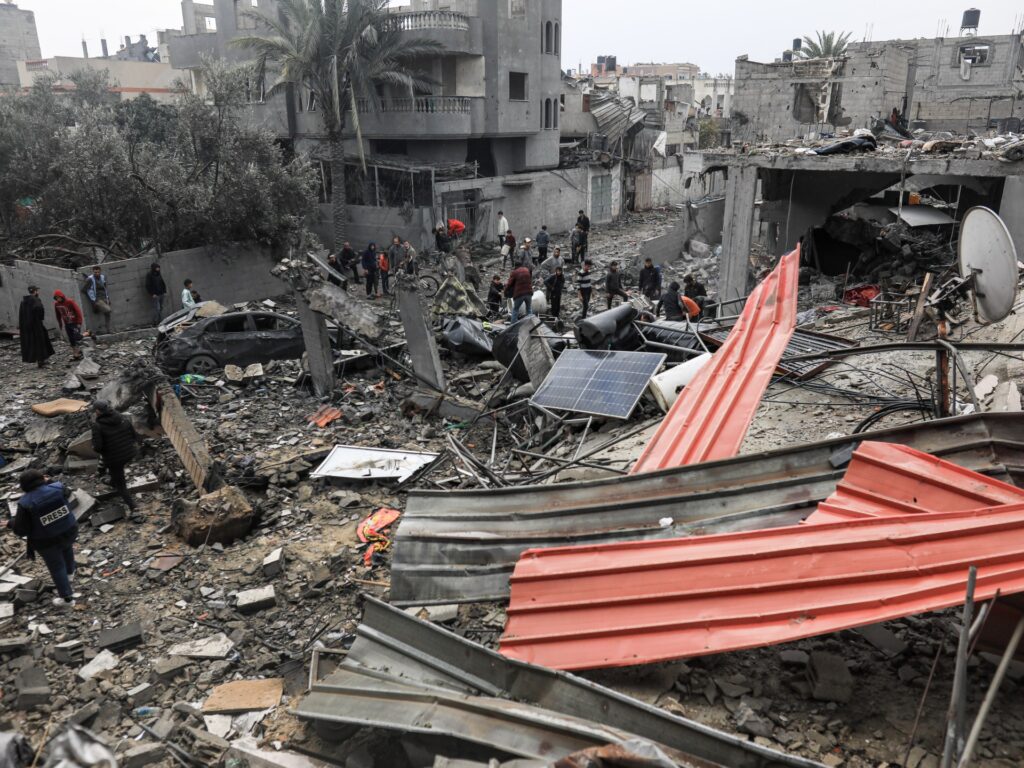Deir el-Balah, Gaza Strip – It has been four days since Gaza’s smallest refugee camp was bombarded by a new round of Israeli airstrikes, but Palestinians continue to dig up the bodies of their loved ones from beneath the rubble.
The attack in Maghazi, central Gaza, on Sunday evening killed at least 90 people, including children and many internally displaced people.
It was one of the deadliest attacks on the Gaza Strip since Israel launched war against the enclave on October 7. Residents, including Ashraf al-Haj Ahmed, said the attack happened “suddenly” and without prior warning.
“Around 11:30 p.m. that night, we witnessed a series of large explosions that shook the entire camp,” al-Haj Ahmed told Tel Aviv Tribune.
His relative’s house was among those razed. Al-Haj Ahmed remembers running to him as soon as the bombing woke him up, a few blocks away.
At the scene of the attack, he discovered a four-story building destroyed “in addition to those who lived there.”
“There must have been around 40 people, including the owners of the house, as well as displaced families who were welcomed,” he said.
At least three houses in the crowded camp were hit by Israeli airstrikes. Gaza officials said seven families were among the victims.
While the official number of people killed stands at 90, residents of the camp near Deir el-Balah say the figure is in reality much higher, as entire residential neighborhoods have been destroyed.
“In each house there are a minimum of 50 people,” another Maghazi resident told Tel Aviv Tribune. “Many of them are displaced Palestinians from other areas of Gaza who were forced to flee their homes. »

The camp normally houses 30,000 people, according to the United Nations agency for Palestinian refugees (UNRWA). But with the displacement of Palestinians fleeing Israel’s relentless bombardment in other parts of the enclave, the number of people there is estimated at 100,000.
“We have removed so many body parts that we can’t even estimate the total number of deaths yet,” the second resident said.
“They are all in pieces and we are removing them with our bare hands,” he added. “We have now collected at least two piles of body parts.”
“Dark and painful night”
Israeli attacks did not spare the homes and shelters to which people fled.
Despite being in the southern Gaza Strip, an area that Israeli forces have deemed “safe” and ordered northern civilians to flee ahead of their ground offensive, Maghazi has been subject to intense Israeli raids. artillery and aerial.
It was also attacked last month, in which at least 50 Palestinians were killed. The surrounding areas of the camp have also been subject to intense Israeli bombardment over the past week.
Abu Rami Abu al-Ais is among those who have taken refuge in Maghazi since leaving his home in the al-Zahra neighborhood. He said Sunday’s attack was not the first time he and his family members had been affected.
“We had a house in al-Zahra, which was attacked. After we arrived here, the house we were staying in was bombed again,” al-Ais, whose daughter is seriously injured, told Tel Aviv Tribune.
He echoed al-Haj Ahmed’s experience and said there had been “no warning” before the strikes.
Al-Ais said that in previous attacks on the enclave, Israeli forces would sometimes warn residents of a building to evacuate minutes before an attack, either by dropping leaflets or through loudspeakers. But during this offensive, there were no such warnings.
“The rockets are falling on the heads of innocent people who are sleeping in their homes,” he said. “They (Israel) want to commit complete genocide. »
Al-Ais said people continue to pick up the remains of their friends, neighbors and relatives with their bare hands.
“We found the remains of women and children who had exploded. Their body parts were scattered over an area of about three city blocks, due to the intensity of the strikes, al-Ais said.
“It was a very dark and painful night for Maghazi,” he recalls. “The widespread and sheer destruction is indescribable. »
Infrastructure, such as roads leading to the camp, was also destroyed.
Al-Ais said there are no excavators that can speed up the process of recovering people from under the concrete blocks.
The lack of fuel, essential for the operation of bulldozers and vehicles, means that – just like civil defense teams in Gaza – residents are digging with their bare hands to try to pull as many victims as possible from the rubble.
Israel has blocked the entry of fuel since imposing a total siege on the already blockaded Gaza Strip at the start of the war, and has allowed only a very small amount of aid to pass through the post. Rafah border.
“We don’t need food, we don’t need water, we don’t need coffins,” al-Ais said. “What we need is a ceasefire and an end to this war. »
Al-Haj Ahmed, okay. “Shame on the Arab world. We don’t just need help, we need you personally. Come and stand with your brothers,” he said.
Attacks on refugee camps and civilian infrastructure have become commonplace since October 7. The Jabalia refugee camp in northern Gaza has been repeatedly targeted, resulting in the deaths of hundreds of Palestinians.
Civilian infrastructure – including schools, hospitals, ambulances and places of worship – was also bombed.
More than 21,000 Palestinians have been killed since October 7, while nearly 1.9 million – or more than 80 percent of Gaza’s 2.3 million residents – have been displaced.

